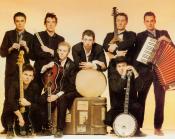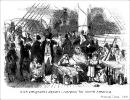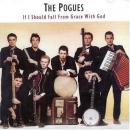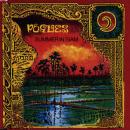Have you ever walked the lonesome hills
And heard the curlews cry
Or seen the raven black as night
Upon a windswept sky
To walk the purple heather
And hear the westwind cry
To know that's where the rapparee must die
Since Cromwell pushed us westward
To live our lowly lives
There's some of us have deemed to fight
From Tipperary mountains high
Noble men with wills of iron
Who are not afraid to die
Who'll fight with gaelic honour held on high
A curse upon you Oliver Cromwell
You who raped our Motherland
I hope you're rotting down in hell
For the horrors that you sent
To our misfortunate forefathers
Whom you robbed of their birthright
"To hell or Connaught" may you burn in hell tonight
Of one such man I'd like to speak
A rapparee by name and deed
His family dispossessed and slaughtered
They put a price upon his head
His name is know in song and story
His deeds are legends still
And murdered for blood money
Was young Ned of the hill
You have robbed our homes and fortunes
Even drove us from our land
You tried to break our spirit
But you'll never understand
The love of dear old Ireland
That will forge and iron will
As long as there are gallant men
Like young Ned of the hill
And heard the curlews cry
Or seen the raven black as night
Upon a windswept sky
To walk the purple heather
And hear the westwind cry
To know that's where the rapparee must die
Since Cromwell pushed us westward
To live our lowly lives
There's some of us have deemed to fight
From Tipperary mountains high
Noble men with wills of iron
Who are not afraid to die
Who'll fight with gaelic honour held on high
A curse upon you Oliver Cromwell
You who raped our Motherland
I hope you're rotting down in hell
For the horrors that you sent
To our misfortunate forefathers
Whom you robbed of their birthright
"To hell or Connaught" may you burn in hell tonight
Of one such man I'd like to speak
A rapparee by name and deed
His family dispossessed and slaughtered
They put a price upon his head
His name is know in song and story
His deeds are legends still
And murdered for blood money
Was young Ned of the hill
You have robbed our homes and fortunes
Even drove us from our land
You tried to break our spirit
But you'll never understand
The love of dear old Ireland
That will forge and iron will
As long as there are gallant men
Like young Ned of the hill
inviata da Alessandro - 16/2/2010 - 15:47
Lingua: Inglese
La versione di Ron Kavana come nell'album "Home Fire" del 1991.
According to the liner notes in "Home Fire", the cd which includes Ron Kavana's version of the song (he co-wrote it with Terry Woods), "there have been numerous songs written about Ned of the Hill both in English and in Irish (Eamonn an Chnoic), but none have told the full story, which is precisely what Terry Woods and myself set out to do in [this song]."
"and hear the westwind cry
To know that's where the rapparee must die..."
Following the defeat of the Irish at the hands of Cromwell's forces, a number of the veterans of the struggle continued what would today be termed "guerrilla warfare" against the English. These men were known as "rapparees." It probably should be noted, though, that more than a few were motivated by the prospect of economic rather than political rewards.
"A curse upon you Oliver Cromwell
You who raped our motherland
I hope you're rotting down in hell
For the horrors that you sent
To our misfortunate forefathers
Whom you robbed of their birthright
'To hell or Connaught' may you burn in hell tonight..."
Cromwell arrived on 15 August 1649 and unleashed a wave of terror across the Irish countryside. Although he stayed on the island for but 9 months, it is difficult to overestimate the effect he had on subsequent Irish history. He is particularly remembered for the massacres at Drogheda (2 September) and Wexford (2 October). The cornerstone of his policy was to expropriate Catholic lands, and "relocate" Irish Catholics to the western parts of the island. The Irish were given two choices, "to hell, or Connacht," that is, die or vacate to the westernmost county on the island.
According to the liner notes in "Home Fire", the cd which includes Ron Kavana's version of the song (he co-wrote it with Terry Woods), "there have been numerous songs written about Ned of the Hill both in English and in Irish (Eamonn an Chnoic), but none have told the full story, which is precisely what Terry Woods and myself set out to do in [this song]."
"and hear the westwind cry
To know that's where the rapparee must die..."
Following the defeat of the Irish at the hands of Cromwell's forces, a number of the veterans of the struggle continued what would today be termed "guerrilla warfare" against the English. These men were known as "rapparees." It probably should be noted, though, that more than a few were motivated by the prospect of economic rather than political rewards.
"A curse upon you Oliver Cromwell
You who raped our motherland
I hope you're rotting down in hell
For the horrors that you sent
To our misfortunate forefathers
Whom you robbed of their birthright
'To hell or Connaught' may you burn in hell tonight..."
Cromwell arrived on 15 August 1649 and unleashed a wave of terror across the Irish countryside. Although he stayed on the island for but 9 months, it is difficult to overestimate the effect he had on subsequent Irish history. He is particularly remembered for the massacres at Drogheda (2 September) and Wexford (2 October). The cornerstone of his policy was to expropriate Catholic lands, and "relocate" Irish Catholics to the western parts of the island. The Irish were given two choices, "to hell, or Connacht," that is, die or vacate to the westernmost county on the island.
YOUNG NED OF THE HILL
Have you ever walked the lonesome hills and heard the curlew's cry
Or seen the raven, black as night, upon a windswept sky?
To walk the purple heather and hear the westwind cry.
To know that where the rapparee must die.
Since Cromwell pushed us westward to live our lowly lives,
There's some of us deemed to fight from Tipperary mountains high
Noble men with wills of iron, who are not afraid to die,
Who will fight with Gaelic honour held on high.
Of one such man I'd like to speak, a rapparee by name and deed
His family dispossessed and slaughtered, he swore to fight the British breed,
His name is known in song and story and his deeds are legend still,
I'll tell you now the sorry fate of Eamonn of the Hill.
CHORUS:
You may rob our house and fortune, even drive us from the land,
But you'll never break our spirit, 'cos you'll never understand
The love of dear old Ireland, that will forge an iron will
As long as there are gallant men like Young Ned of the Hill.
A scourge to the redcoat soldiers with a price upon his head,
To tempt a weaker soul to tell where he kept his bed,
One night as he lay sleeping, his head beside his sword,
Murdered by his cousin Dwyer to claim a coward's reward,
The day after O'Dwyer had murdered Young Ned in his bed,
He went for his blood money but was jailed himself instead,
For poor Ned he had been pardoned the very day before,
And a noose upon the gallows was O'Dwyer's just reward.
A curse upon you Oliver Cromwell, you who raped our motherland,
I hope you're rotting down in hell for the horrors that you sent
To our misfortunate forefathers whom you robbed of their birthright
'To Hell or Connaught,' may you burn in hell tonight."
Have you ever walked the lonesome hills and heard the curlew's cry
Or seen the raven, black as night, upon a windswept sky?
To walk the purple heather and hear the westwind cry.
To know that where the rapparee must die.
Since Cromwell pushed us westward to live our lowly lives,
There's some of us deemed to fight from Tipperary mountains high
Noble men with wills of iron, who are not afraid to die,
Who will fight with Gaelic honour held on high.
Of one such man I'd like to speak, a rapparee by name and deed
His family dispossessed and slaughtered, he swore to fight the British breed,
His name is known in song and story and his deeds are legend still,
I'll tell you now the sorry fate of Eamonn of the Hill.
CHORUS:
You may rob our house and fortune, even drive us from the land,
But you'll never break our spirit, 'cos you'll never understand
The love of dear old Ireland, that will forge an iron will
As long as there are gallant men like Young Ned of the Hill.
A scourge to the redcoat soldiers with a price upon his head,
To tempt a weaker soul to tell where he kept his bed,
One night as he lay sleeping, his head beside his sword,
Murdered by his cousin Dwyer to claim a coward's reward,
The day after O'Dwyer had murdered Young Ned in his bed,
He went for his blood money but was jailed himself instead,
For poor Ned he had been pardoned the very day before,
And a noose upon the gallows was O'Dwyer's just reward.
A curse upon you Oliver Cromwell, you who raped our motherland,
I hope you're rotting down in hell for the horrors that you sent
To our misfortunate forefathers whom you robbed of their birthright
'To Hell or Connaught,' may you burn in hell tonight."
inviata da Alessandro - 16/2/2010 - 16:05
Lingua: Gaelico irlandese
La ballata originale gaelica
Siccome – come dicevo - di versioni di questa ballata ce ne sono davvero molte, ho scelto di postare qui il testo in gaelico e la sua traduzione inglese come trovate su questa pagina
Siccome – come dicevo - di versioni di questa ballata ce ne sono davvero molte, ho scelto di postare qui il testo in gaelico e la sua traduzione inglese come trovate su questa pagina
ÉAMONN AN CHNOIC
"Cé hé sin amu
a bhfuil faobhar a ghuth,
a’ réabadh mo dhorais dhúnta?"
"Mise Éamonn a' Chnoic,
atá báite fuar fliuch,
ó shíor-shiúl sléibhte is gleannta."
"A lao ghil 's a chuid,
cad a dheánfainn-se dhuit
mura gcuirfinn ort binn de mo ghúna?
'S go mbeidh púdar dubh
'á lámhach linn go tiubh,
‘s go mbeidh muid araon múchta!"
"Is fada mise amu
faoi shneachta is faoi shioc,
‘s gan dánacht agam ar éinne.
Mo bhranar gan cur,
mo sheisreach gan scor,
is gan iad agam ar aon chor!
Níl cara agam—
is danaid liom sin—
a ghlacfadh mé moch ná déanach.
‘S go gcaithfe mé ghoil
thar fairraige soir,
ó's ann nach bhfuil mo ghaolta."
"Cé hé sin amu
a bhfuil faobhar a ghuth,
a’ réabadh mo dhorais dhúnta?"
"Mise Éamonn a' Chnoic,
atá báite fuar fliuch,
ó shíor-shiúl sléibhte is gleannta."
"A lao ghil 's a chuid,
cad a dheánfainn-se dhuit
mura gcuirfinn ort binn de mo ghúna?
'S go mbeidh púdar dubh
'á lámhach linn go tiubh,
‘s go mbeidh muid araon múchta!"
"Is fada mise amu
faoi shneachta is faoi shioc,
‘s gan dánacht agam ar éinne.
Mo bhranar gan cur,
mo sheisreach gan scor,
is gan iad agam ar aon chor!
Níl cara agam—
is danaid liom sin—
a ghlacfadh mé moch ná déanach.
‘S go gcaithfe mé ghoil
thar fairraige soir,
ó's ann nach bhfuil mo ghaolta."
inviata da Alessandro - 17/2/2010 - 09:13
Lingua: Inglese
Versione inglese della ballata originale in gaelico
ÉAMONN OF THE HILL
"Who's that outside
whose voice is urgent,
pounding on my closed door?"
"I'm Éamonn of the hill,
drowned, cold and wet,
from endlessly traveling mountains and glens."
"Dearest love and treasure,
what can I do for you
but cover you with the lap of my dress?"
And black gunpowder will be
fired endlessly at us,
and we will both perish!"
"I've long been outside
in snow and in frost,
not daring to approach anyone.
My fallow unplanted,
my team in need of unyoking,
and I no longer have them at all!
I have no friend—
how that grieves me—
who’d take me in, early or late.
And so I must go
eastward across the sea,
for it’s there I have no kindred."
"Who's that outside
whose voice is urgent,
pounding on my closed door?"
"I'm Éamonn of the hill,
drowned, cold and wet,
from endlessly traveling mountains and glens."
"Dearest love and treasure,
what can I do for you
but cover you with the lap of my dress?"
And black gunpowder will be
fired endlessly at us,
and we will both perish!"
"I've long been outside
in snow and in frost,
not daring to approach anyone.
My fallow unplanted,
my team in need of unyoking,
and I no longer have them at all!
I have no friend—
how that grieves me—
who’d take me in, early or late.
And so I must go
eastward across the sea,
for it’s there I have no kindred."
inviata da Alessandro - 17/2/2010 - 09:14
Lingua: Italiano
Versione italiana di Cattia Salto
La versione scritta da Ron Kavanna e Terry Woods per il gruppo dei Pogues nel 1989 vuole essere una versione più decisamente politicizzata della storia. Qui Oliver Cromwell, sebbene non contemporaneo a Ned, viene preso come emblema dell’oppressione inglese.
continua in Terre celtiche
La versione scritta da Ron Kavanna e Terry Woods per il gruppo dei Pogues nel 1989 vuole essere una versione più decisamente politicizzata della storia. Qui Oliver Cromwell, sebbene non contemporaneo a Ned, viene preso come emblema dell’oppressione inglese.
continua in Terre celtiche
IL GIOVANE NED DELLA COLLINA
Avete mai attraversato le colline solitarie
e sentito il verso dei chiurli
o visto il corvo nero come la notte
in un cielo spazzato dal vento
o raggiunto a piedi l’erica purpurea
e ascoltato il grido del vento dell’ovest
per sapere che è lì dove il ribelle(1) deve morire?
Quando Cromwell ci ha spinto verso ovest
per vivere le nostre vite da umili
molti di noi hanno ritenuto di combattere
dalle montagne alte di Tipperary
Uomini nobili, con volontà di ferro
che non hanno paura di morire
e lotteranno tenendo alto l’onore celtico
Una maledizione su di te, Oliver Cromwell
tu che hai violentato la nostra Patria.
Che tu possa marcire giù all’inferno
per gli orrori che hai mandato
ai nostri antenati sfortunati
ai quali hai rubato il loro diritto di nascita (dicendo)
“Andate al diavolo o nel Connaught!(2)” che tu possa bruciare all’inferno stasera!
Di un uomo così vorrei parlare
un ribelle di nome e di fatto
la sua famiglia spodestata e smembrata(3).
Hanno messo una taglia sulla sua testa
il suo nome è conosciuto nella ballata e nella storia
le sue gesta sono ancora leggenda,
ucciso per il prezzo del sangue
fu il giovane Ned della collina.
Avete rubato le nostre case e i beni
ci avete persino allontanati dalla nostra terra,
avete cercato di spezzare il nostro spirito
ma non capirete mai
che l’amore per la cara vecchia Irlanda
forgerà una volontà di ferro
finché ci sono uomini valorosi
come il giovane Ned della collina
Avete mai attraversato le colline solitarie
e sentito il verso dei chiurli
o visto il corvo nero come la notte
in un cielo spazzato dal vento
o raggiunto a piedi l’erica purpurea
e ascoltato il grido del vento dell’ovest
per sapere che è lì dove il ribelle(1) deve morire?
Quando Cromwell ci ha spinto verso ovest
per vivere le nostre vite da umili
molti di noi hanno ritenuto di combattere
dalle montagne alte di Tipperary
Uomini nobili, con volontà di ferro
che non hanno paura di morire
e lotteranno tenendo alto l’onore celtico
Una maledizione su di te, Oliver Cromwell
tu che hai violentato la nostra Patria.
Che tu possa marcire giù all’inferno
per gli orrori che hai mandato
ai nostri antenati sfortunati
ai quali hai rubato il loro diritto di nascita (dicendo)
“Andate al diavolo o nel Connaught!(2)” che tu possa bruciare all’inferno stasera!
Di un uomo così vorrei parlare
un ribelle di nome e di fatto
la sua famiglia spodestata e smembrata(3).
Hanno messo una taglia sulla sua testa
il suo nome è conosciuto nella ballata e nella storia
le sue gesta sono ancora leggenda,
ucciso per il prezzo del sangue
fu il giovane Ned della collina.
Avete rubato le nostre case e i beni
ci avete persino allontanati dalla nostra terra,
avete cercato di spezzare il nostro spirito
ma non capirete mai
che l’amore per la cara vecchia Irlanda
forgerà una volontà di ferro
finché ci sono uomini valorosi
come il giovane Ned della collina
NOTE
(1) in questo contesto non si tratta di un bandito ma di un ribelle o un guerrigliero!
(2) Qui Cromwell, deceduto nel 1658, quando Ned aveva 12 anni, viene preso come emblema dell’oppressione inglese. Con l’Act of Settlement del 1652 ai soldati irlandesi che avevano combattuto contro l’invasione delle loro terre venne data come scelta “la morte o l’esilio”. Potevano morire oppure abbandonare le loro case per andare nei territori più poveri dell’Ovest in una sorta di confino il cui “muro” era formato dal fiume Shannon.
I terreni confiscati agli irlandesi che non avevano manifestato il loro amore per la Corona vennero ridistribuiti ai coloni inglesi e scozzesi.
(3) che la famiglia degli O’Ryans di Knockmeoll, Atshanbohy, Contea di Tipperary fosse stata privata di gran parte delle sue terre è storicamente documento, ma non che ci siano stati eccidi particolarmente efferati. Sono propensa a tradurre “slaughtered” più in senso figurato invece di “macellata”
(1) in questo contesto non si tratta di un bandito ma di un ribelle o un guerrigliero!
(2) Qui Cromwell, deceduto nel 1658, quando Ned aveva 12 anni, viene preso come emblema dell’oppressione inglese. Con l’Act of Settlement del 1652 ai soldati irlandesi che avevano combattuto contro l’invasione delle loro terre venne data come scelta “la morte o l’esilio”. Potevano morire oppure abbandonare le loro case per andare nei territori più poveri dell’Ovest in una sorta di confino il cui “muro” era formato dal fiume Shannon.
I terreni confiscati agli irlandesi che non avevano manifestato il loro amore per la Corona vennero ridistribuiti ai coloni inglesi e scozzesi.
(3) che la famiglia degli O’Ryans di Knockmeoll, Atshanbohy, Contea di Tipperary fosse stata privata di gran parte delle sue terre è storicamente documento, ma non che ci siano stati eccidi particolarmente efferati. Sono propensa a tradurre “slaughtered” più in senso figurato invece di “macellata”
inviata da Cattia Salto - 5/10/2015 - 23:23
Lingua: Italiano
Versione italiana di Cattia Salto
“Chi è che là fuori
chiama con urgenza
e batte alla mia porta chiusa?”
“Sono Edmund della Collina,
zuppo, gelido e bagnato(1)
e senza posa viaggio per montagne e valli!”
“Carissimo amore e tesoro
cosa posso fare per te
se non avvolgerti nel mio mantello?
E la neve cadrà su di noi
finchè entrambi ne saremo ricoperti”
“Sono stato a lungo un fuorilegge
tra la neve e il gelo,
senza fidarmi di nessuno.
La mia terra a maggese,
i miei cavalli senza il giogo(2)
-non più mi appartengono!(3)
Non avrò amico
-quale pena-
che mi accoglierà, sia presto o tardi.
Così devo andare
verso est per il mare,
perché è dove non ho legami”(4)
chiama con urgenza
e batte alla mia porta chiusa?”
“Sono Edmund della Collina,
zuppo, gelido e bagnato(1)
e senza posa viaggio per montagne e valli!”
“Carissimo amore e tesoro
cosa posso fare per te
se non avvolgerti nel mio mantello?
E la neve cadrà su di noi
finchè entrambi ne saremo ricoperti”
“Sono stato a lungo un fuorilegge
tra la neve e il gelo,
senza fidarmi di nessuno.
La mia terra a maggese,
i miei cavalli senza il giogo(2)
-non più mi appartengono!(3)
Non avrò amico
-quale pena-
che mi accoglierà, sia presto o tardi.
Così devo andare
verso est per il mare,
perché è dove non ho legami”(4)
NOTE
1) Il tema dell’isolamento del fuorilegge e della sua sofferenza alle intemperie è un classico nelle descrizioni dei disagi a cui vanno incontro coloro che vivono da braccati, ma è anche un modo per sottolineare il coraggio e lo spirito di sacrificio di Edmond; si mette in evidenza così la sua vulnerabilità per suscitare empatia e compassione.
2)seisreach = plough team
gan scor = without having been unyoked / unharnessed
3)il senso della frase è “I haven’t finished the work of plowing and planting, but how could I, seeing as how I don’t have a team or land anyway!”
4)nella tradizione irlandese il fuorilegge può essere annientato solo con mezzi sleali o con il tradimento, ciò lo rende un martire da venerare. Spesso, ma non in questo caso, quando il fuorilegge viene meno al codice morale improntato alla difesa del più debole, viene punito con la sconfitta
1) Il tema dell’isolamento del fuorilegge e della sua sofferenza alle intemperie è un classico nelle descrizioni dei disagi a cui vanno incontro coloro che vivono da braccati, ma è anche un modo per sottolineare il coraggio e lo spirito di sacrificio di Edmond; si mette in evidenza così la sua vulnerabilità per suscitare empatia e compassione.
2)seisreach = plough team
gan scor = without having been unyoked / unharnessed
3)il senso della frase è “I haven’t finished the work of plowing and planting, but how could I, seeing as how I don’t have a team or land anyway!”
4)nella tradizione irlandese il fuorilegge può essere annientato solo con mezzi sleali o con il tradimento, ciò lo rende un martire da venerare. Spesso, ma non in questo caso, quando il fuorilegge viene meno al codice morale improntato alla difesa del più debole, viene punito con la sconfitta
inviata da Cattia Salto - 5/10/2015 - 23:39
Alla versione in gaelico della ballata si aggiunge un'ulteriore strofa riportata dalla tradizione orale
A chumann ‘s a shearc,
ó rachaimid seal faoi choillte
na meas cumhra,
Mar a bhfaighimid an breac
is an lon ar a nead,
an fia ‘gus an poc ag búireach,
An fhia ‘gus an poc(1) ag búireach
Na h-éiníní binne
Ar ghéigíní a’ seinm
Is an cuaichín ar bharr an úir ghlais
Is go brách, brách,
ní thiocfaidh an bás in ár ngáire i lár
na coille cumhra.
la traduzione in inglese dice:
My friend and my love,
oh let’s go for a while
to the woods of the fragrant beeches,
Where we’ll find the trout
and the blackbird on her nest,
the deer and the goat(1) braying,
Sweet little birds singing on branches,
And the little cuckoo on top of the green yew tree;
And never, never will death come into our laughter in the midst of the fragrant woods
e in italiano:
Amore mio
andremo raminghi
per boschi odorosi
di alberi in fiore
dove troveremo la trota
e il merlo nel suo nido
il richiamo del cervo e del capro,
gli uccellini che cantano tra i rami
e il piccolo cuculo
in cima al tasso sempreverde
e mai, mai
la morte ci coglierà trai sorrisi
nel profondo del bosco odoroso
NOTA
1) ‘Poc’ could be a male deer or a male goat. It could be a buck or a billy-goat.
A chumann ‘s a shearc,
ó rachaimid seal faoi choillte
na meas cumhra,
Mar a bhfaighimid an breac
is an lon ar a nead,
an fia ‘gus an poc ag búireach,
An fhia ‘gus an poc(1) ag búireach
Na h-éiníní binne
Ar ghéigíní a’ seinm
Is an cuaichín ar bharr an úir ghlais
Is go brách, brách,
ní thiocfaidh an bás in ár ngáire i lár
na coille cumhra.
la traduzione in inglese dice:
My friend and my love,
oh let’s go for a while
to the woods of the fragrant beeches,
Where we’ll find the trout
and the blackbird on her nest,
the deer and the goat(1) braying,
Sweet little birds singing on branches,
And the little cuckoo on top of the green yew tree;
And never, never will death come into our laughter in the midst of the fragrant woods
e in italiano:
Amore mio
andremo raminghi
per boschi odorosi
di alberi in fiore
dove troveremo la trota
e il merlo nel suo nido
il richiamo del cervo e del capro,
gli uccellini che cantano tra i rami
e il piccolo cuculo
in cima al tasso sempreverde
e mai, mai
la morte ci coglierà trai sorrisi
nel profondo del bosco odoroso
NOTA
1) ‘Poc’ could be a male deer or a male goat. It could be a buck or a billy-goat.
Cattia Salto - 5/10/2015 - 23:45
×
![]()








Album "Peace and Love"
Scritta da Terry Woods e Ron Kavana.
Presenteanche nell'album di Ron Kavana "Home Fire" del 1991.
“Young Ned Of The Hill” dei Pogues/Kavana è soltanto la più recente delle svariate versioni di un’antica canzone popolare irlandese in lingua gaelica, ossia “Éamonn an Chnoic”, “Éamonn of the Hill”.
According to en.wikipedia, la ballata racconta della dura vita alla macchia di tal Éamonn Ó Riain (Edmund Ryan, personaggio sulla cui storicità vi sono dubbi), che sarebbe stato un possidente irlandese originario di una località chiamata Cnoc Maothaill (“The Bald Hill”) presso Templemore, nella Contea Tipperary, che era stato espropriato delle proprie terre in seguito all’invasione inglese del 1649. La leggenda racconta che Éamonn intervenne a difesa di una vicina, una povera vedova, aggredita dagli sgherri di Cromwell che volevano sottrarle una mucca… Éamonn li mise in fuga, uccidendone uno, e così divenne un ricercato, un ribelle, un “ropairí” con sulla testa una bella taglia. Braccato dagli inglesi, nel cuore dell’inverno, Éamonn era costretto a chiedere rifugio ai suoi conterranei, e pare che morì per mano di uno di loro che lo uccise nel sonno per riscuotere la lauta taglia… Si dice che le sue spoglie siano sepolte a Dún Bleisce, presso Limerick…